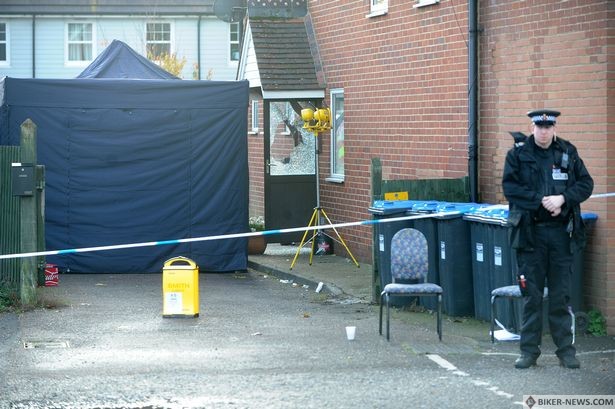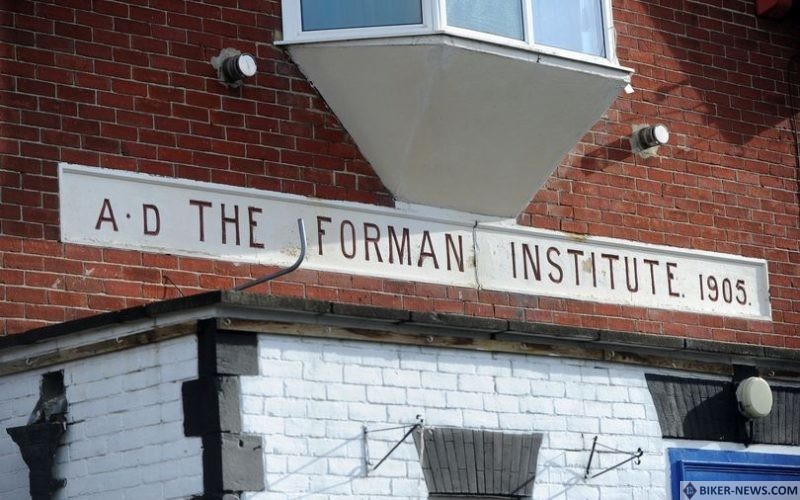The attack at the Forman Institute, described as “badly planned and badly executed”, left six men stabbed and badly beaten.
Lawyers have begun making their final pitches to the jury in the trial of seven bikers accused of carrying out a violent attack on a rival motorcycle club in Blindley Heath.
The attack at the Forman Institute on November 7 2018 left six men stabbed and beaten, in what the prosecutor Richard Hearnden said was part of a “turf war” between the Hells Angels and Vikings motorcycle clubs.
The defendants are all said to be “prospects” – prospective members – of the Hells Angels’ Slough chapter or their support club, the Red Devils, while the victims were all members of the Vikings or their affiliated club, the Wargs Brotherhood.
Speaking towards the end of a six-week trial at Kingston Crown Court, Mr Hearnden said the Hells Angels had wanted to set up a new chapter in Surrey but needed to “deal with” their rivals, the Vikings.
He alleged to the jury that one of the defendants, Jimi Kidd, himself a former Viking, suggested “picking off the Wargs” by trying to persuade them to affiliate with the Hells Angels rather than the Vikings. But, Mr Hearnden said, after a meeting with the Wargs at Cobham Services on November 1, it became apparent the Vikings would resist.
“So they hatched a last minute plan, but because it’s a last minute plan, it is badly planned and badly executed,” he said.
He said some defendants drove their own cars to the attack while others brought their phones with them, linking them to the scene. One defendant, Przemyslaw Korkus, was found with the blood of one of the victim’s on his clothes, while the DNA of another, Piotr Zamijewski, was found on a cable allegedly used as a weapon in the attack.

All seven defendants have presented different defences, some saying they were never in Blindley Heath and others admitting they went there, but for different reasons.
“What they rely on is a series of very, very unfortunate coincidences,” Mr Hearnden said.
“Either as police investigations go this is one of the worst ever, in which, of 13 suspects, all seven men who were arrested were all in the wrong place at the wrong time, or they are guilty.
“To quote Oscar Wilde, for one person to be in the wrong place at the wrong time might be unfortunate, for two people it looks like carelessness, but three or four or seven begins to look like something very different.”
‘Deficiencies’ in Crown’s case, alleges Korkus’s barrister
In his closing speech, Mr Korkus’s barrister, Jon Harrison, said there were “deficiencies in the way the Crown has put their case and accused Mr Hearnden of “making it up as he goes along”.
In one instance, he accused the prosecution of “cherry picking” images of weapons from the cache folder of Mr Korkus’s phone, which he said were “not even close to the majority of the items” in that folder and were created so quickly that they could not have been deliberately saved by a human.
He also suggested that the victims had failed to describe any of their assailants as being similar to Mr Korkus, whom he said was “a 25 stone man more akin to a WWE wrestler”.
Finally, he highlighted his client’s claim that, at the time of the attack, he was parked nearby and looking at his phone while waiting for some friends who were moving house and who he had dropped off earlier.
Mr Korkus’s phone records show, he said, that at the time of the attack it was accessing the internet, although he admitted this was not conclusive proof that Mr Korkus was deliberately using his phone and could have been an automated update.
“But how did Mr Korkus know that when the police got round to checking his phone, there would be something that support what he says he was doing?” Mr Harrison asked, suggesting it would have required Mr Korkus to be “forensically psychic”.
“The Crown want you to ignore all the circumstantial evidence that assists the defence,” he concluded. “They want you to forget about it, to pretend it doesn’t exist.”
Jimi Kidd ‘the mediator’
On behalf of Mr Kidd, Roxanne Morell described her client as “the mediator”, saying he had played that role for six years while he was still a member of the Vikings and that he was still exchanging friendly messages with a senior member of the Wargs in the days after he is alleged to have attacked their clubhouse in Blindley Heath.
She accepted that Mr Kidd had initially lied to police about being at Blindley Heath and had not been fully cooperative, even when he began to give evidence.
However, she said this was out of fear about what might happen to him or his family if he did cooperate, especially given the press coverage of the trial.
Mr Kidd has subsequently admitted being in the Blindley Heath area at the time of the attack, but said he was there to meet a friend – known as “Lurch” – for a drink on the way to visiting his parents.
All seven defendants – Korkus, Kidd, Zamijewski, David Jacobs, Tamas Tomacsek, Ladislav Szalay and Bartosz Plesniak – deny involvement in the attack.
The trial continues.
Source: SurreyLive
